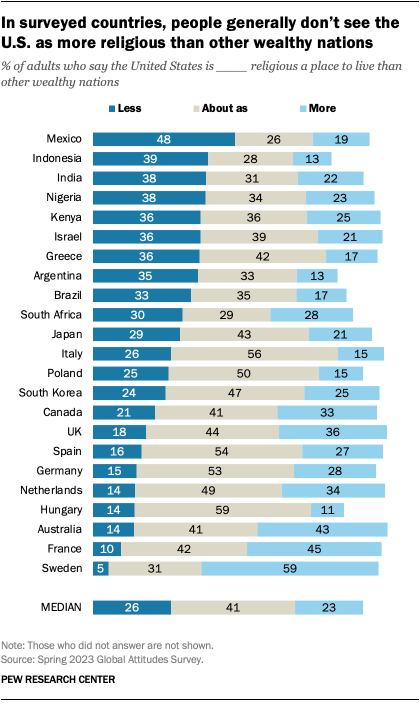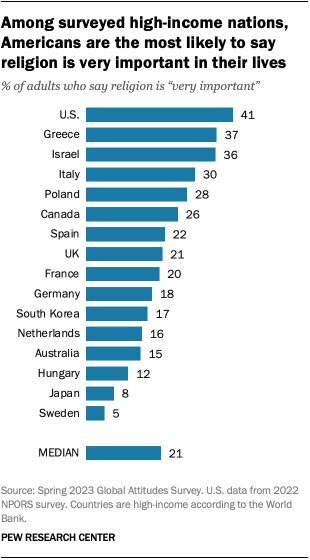A modest share of people around the world see the United States as more religious than other wealthy nations – despite considerable evidence that it is.
This Pew Research Center analysis examines how people in 23 surveyed countries view the religiosity of the United States, as well as how the U.S. compares with other wealthy nations in terms of religion.
This analysis draws on nationally representative surveys of 27,285 adults conducted from Feb. 20 to May 22, 2023. All surveys were conducted over the phone with adults in Canada, France, Germany, Greece, Italy, Japan, the Netherlands, South Korea, Spain, Sweden and the United Kingdom. Surveys were conducted face-to-face in Hungary, Poland, India, Indonesia, Israel, Kenya, Nigeria, South Africa, Argentina, Brazil and Mexico. In Australia, we used a mixed-mode probability-based online panel.
Data from the U.S. on the importance of religion in people’s lives – as well as Americans’ rates of affiliation – come from a published analysis based on the Center’s 2021 National Public Opinion Reference Survey (NPORS). The survey was conducted online and by mail among a nationally representative group of respondents recruited using address-based sampling, which ensures that nearly all U.S. adults have a chance of selection. The study was conducted from May 29 to Aug. 25, 2021.

A global median of 23% of adults say the U.S. is more religious than other wealthy nations, according to a Pew Research Center survey of 23 countries conducted this spring. Far more adults in these countries say the U.S. is either about as religious as other wealthy nations (a median of 41% say this) or less religious than other wealthy nations (a median of 26% say this).
In many surveyed countries, the most common response is that the U.S. is about as religious as other wealthy nations. More than half of all adults say this in Hungary (59%) and Spain (54%), for example.
In some countries, large shares say the U.S. is less religious than other wealthy nations. Nearly half of adults (48%) say this in Mexico – one of nine surveyed countries in which at least 33% of adults say this.
How the U.S. compares religiously with other wealthy nations

Perceptions aside, there is evidence from multiple cross-national surveys that the U.S. is considerably more religious than similarly wealthy nations.
Looking at the high-income nations included in the Center’s spring survey, U.S. adults are more likely than many others to say religion is very important in their life. Around four-in-ten Americans (41%) say this – almost twice as many (21%) as the median share for wealthy countries surveyed. (This analysis uses the World Bank’s definition of high-income countries.)
But the U.S. is more similar to its wealthy peers in its shares of religiously affiliated adults. About 70% of U.S. adults say they belong to some religion – compared with a median of 64% in the other high-income countries included in the spring survey.
A 2018 Center analysis also showed that the U.S. stands out among wealthy countries in terms of religious commitment. Out of 102 countries analyzed, the U.S. was the only one with both above-average gross domestic product per capita and above-average frequency of daily prayer.
Still, as is the case in other wealthy countries, religious commitment has been falling in the U.S. in recent decades. Since the 1990s, the share of U.S. adults who identify as atheist, agnostic or “nothing in particular” has risen from about 8% to 29%. And Pew Research Center projections suggest that the religiously unaffiliated may outnumber Christians in the U.S. the coming decades.





